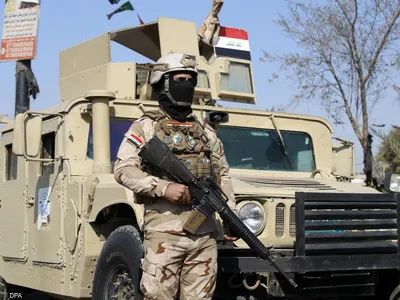
-
Published: 29 December 2022

In the context of responding to the recent upsurge in the frequency of ISIS attacks in Iraq, the Ministry of Interior revealed that it is in the process of dealing painful blows to
the organization, which has carried out a series of operations against Iraqi civilians and military personnel over the past few days, and dozens of them have been killed and wounded.
The spokesman for the Iraqi Interior Ministry, Major General Khaled al-Muhanna, assured the official agency that the authorities "continue to carry out proactive operations targeting ISIS terrorist gangs, in addition to the qualitative operations carried out by intelligence services and security forces and effective air strikes," indicating that "terrorist threats still exist in some remote and remote areas.
He added that" there is a will of the government and the Ministry of Interior to raise the effectiveness, through a coordinated plan and measures to support the intelligence services and security sectors, redeployment and coordination with the air force, "pointing out that"the coming days will witness the implementation of painful blows to ISIS terrorist gangs".
These statements promising to strike ISIS with an iron hand come after Iraqi Prime Minister Mohammed Shiaa al-Sudani announced earlier that "what happened will not pass without the perpetrators receiving retribution," directing "military commanders to re-evaluate the plans developed, change the military tactics used in areas where terrorist remnants are active, and adopt unconventional methods of confrontation, in a way that weakens the capabilities of ISIS terrorist elements and limits their movement.
Experts in the fight against terrorist groups warn that ISIS is seeking to return in the provinces of Iraq, which it occupied large parts of between 2014 and 2017.
The specialists add that what is required in order to remedy this imminent danger is to intensify and review security plans and expand the scope of proactive intelligence and military operations against the organization's dens and sleeper cells in the provinces where those remnants are present, from Diyala to the east through Salah al-Din and Kirkuk, to Nineveh and Anbar to the West, and across the Iraqi-Syrian border .
There are calls to adopt non-traditional methods to confront Daesh and the intention to deal severe blows to them, because this would be commensurate with the seriousness of the bloody operations carried out by the terrorist organization.
Iraq can resort to enhancing the role of forces in monitoring and destroying ISIS headquarters and places of their deployment, including marches and helicopters, as well as increasing the use of modern defense and security technologies such as thermal cameras.
